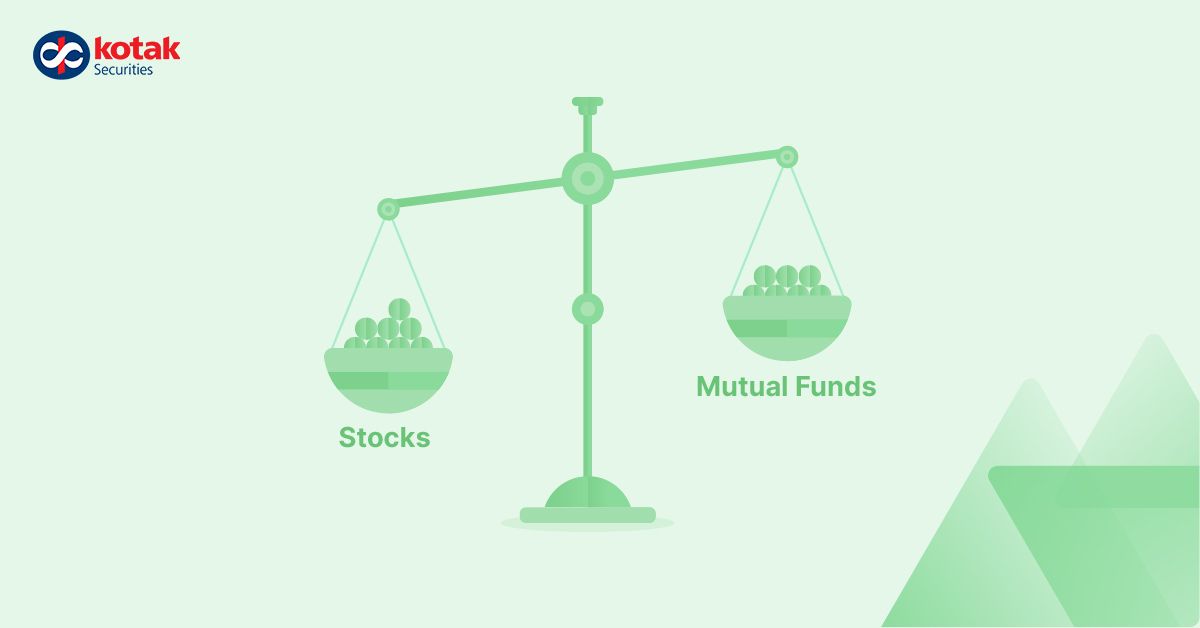What is the Difference Between Mutual Funds and Equities?
Equities and mutual funds are two options for investors looking for wealth creation for various life goals. While the ultimate aim of both are the same, they differ in several aspects. Knowing the difference between equities and mutual funds can help you make an informed choice. So, what are these differences? Let’s find out.
What are mutual funds?
Mutual funds pool money from many investors and invest in underlying securities. They are professionally managed by fund managers, and equity mutual funds invest your money in different companies’ equities. Think of mutual funds as a big basket comprising equities of more than one company, where the contribution is from more than one investor.
What are Equities?
Equities refers to the shares of ownership in a single company. When you invest in equities, you become the shareholder of the company and the returns you get depend on the company’s performance. Unlike mutual funds, equities investment entails buying and owning individual company shares.
Difference between equities and mutual funds
The table captures the key difference between mutual funds and Equities on various parameters:
| Parameters | Mutual Fund | Equities |
|---|---|---|
Definition | Pools money from several investors, spreading them in various securities | Indicates partial ownership in the company |
Risk | Carries lower risk as the investment is spread across securities | Carries higher risk as returns directly depend on the company’s performance |
Diversification | High | Low |
Management | Managed by expert fund managers | Managed by individual investors |
Control | Offers relatively less control as fund managers make investment decisions | Gives you more control in picking stocks, and buying/selling them |
Liquidity | High | High |
Equities or mutual funds - what should you choose?
Now that you know the differences between equities and mutual funds, the question is where you should put your money. Investing in both can be rewarding if done right. That said, you need to consider certain factors before making a choice. These include:
- Time and convenience for market monitoring
If you have the time to monitor markets, understand them, and do the number crunching, you can go for equities investment. On the other hand, if you can’t do so, mutual funds are a better option, as the fund manager does that on your behalf and makes investment decisions.
- Diversification needs
If you want greater diversification, mutual funds are the way to go. On the other hand, equities offer limited diversification as your investment is into equities.
- Risk tolerance
If you have a high-risk tolerance, you can invest in Equities. On the other hand, if you have comparatively lower risk tolerance, mutual funds are a better option. Mutual funds are relatively less risky as they spread your investments across securities.
Summing it up
Both equities and mutual funds have the potential to offer inflation-beating returns in the long run. Regardless of your choice, invest in fundamentally strong equities or mutual funds and keep investing for an extended period. Don’t act under the impulse and seek professional help, if required.
Discover the top reasons to choose mutual funds and grow your wealth.
FAQs on difference between mutual funds and equities
Is it better to invest in Equities or mutual funds?
Both Equities and mutual funds have the potential to offer high returns. The choice depends on your confidence in trading decisions, risk tolerance, ability to perform fundamental research, and diversification needs.
Which is more profitable - Equities or mutual funds?
Both of them may be fairly profitable if done right. Invest in equities if you have a higher risk tolerance and can perform technical analysis. Otherwise, choose mutual funds.
Are equities riskier than mutual funds?
That depends on the type of equities you pick and the category of mutual funds. For example, buying mid cap or small cap equities may be riskier than investing in a large cap mutual fund. On the other hand, investing in small cap or sectoral mutual funds may be riskier than buying large cap equities individually.

